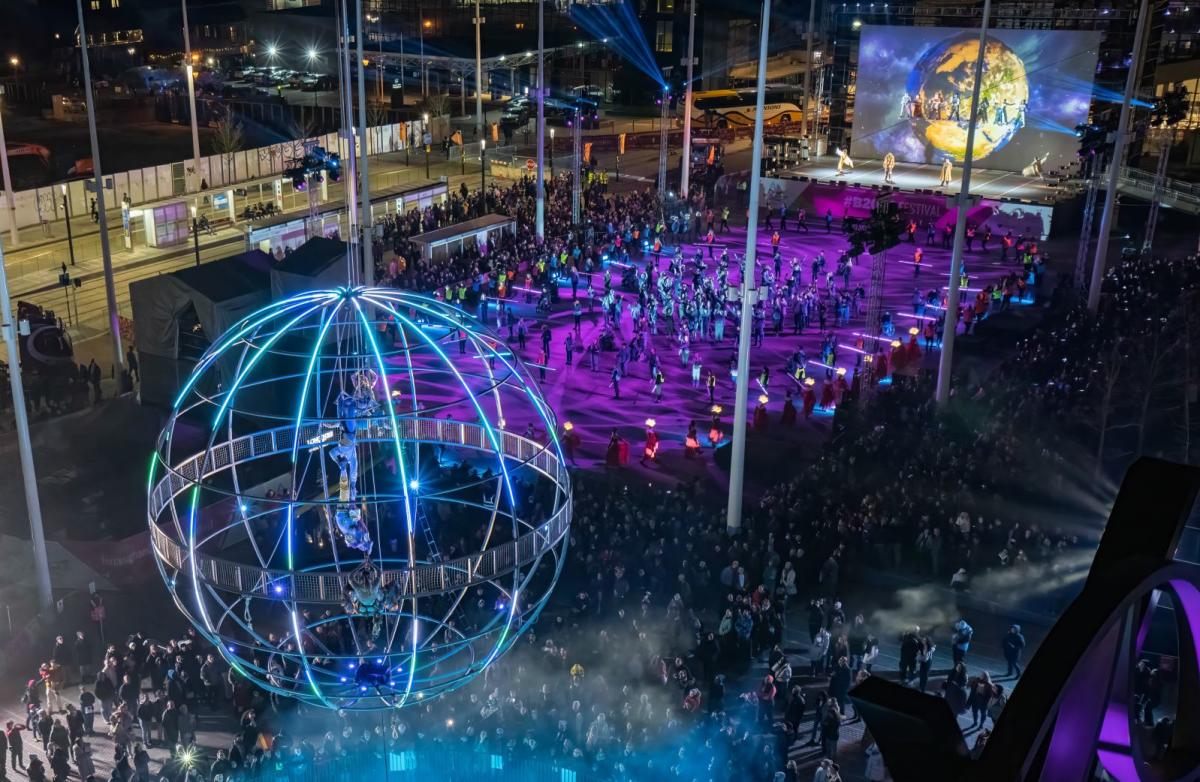The Birmingham 2022 Festival, the six-month celebration of creativity that accompanied the Commonwealth Games, brought not only pride and joy to the city – it gave a dramatic boost to the regional economy, new reports have revealed.
A series of independent evaluation reports, published today at the Birmingham 2022 Festival Insight Event at the Birmingham Hippodrome, show the overall impact of the Festival as well as delving into key aspects of the programme and its effect on those who participated and attended as well as the wider region.
The nine independently-produced reports – available here – evaluate the successes, learnings and impact of the vibrant and dynamic six-month cultural programme. They include the insights and learnings on individual projects and initiatives during the Festival and a commitment to cement Birmingham’s reputation as an international centre of cultural and creative excellence.
They reveal powerful impacts on communities across the region and how it had diversity at its heart by engaging with a wide range of communities that represent ethnic diversity, gender, LGBTQIA+ and disability identities.
The reports also show a direct economic impact of £100 million and a further £87 million in GVA – additional value to the economy – including £47 million directly from tourists.
The evaluation shows a total attendance for the Festival Programme of 2,467,588, with 96 per cent of attendees rating their experience as good or excellent, while eight out of ten residents of the region said it had improved their own perceptions of where they live.
The combined workforce was 4,954 including staff and freelancers, with an additional 1,315 volunteers contributing to the Festival.

The Birmingham 2022 Festival successfully engaged 41,894 residents in active arts or cultural activities with the majority of participants directly engaged in an event performance or a creative project, with eight out of ten saying they had either gained new skills or improved skills.
The Festival directly commissioned 34 per cent of the projects while the overwhelming majority (63 per cent) saw more than £1.7 million distributed through the Creative City Grants programme that brought communities together with artists to create work for the Festival – from visual arts through to dance. This helped to take the Festival to people and places who would not normally engage with the arts.
Alongside that was a series of aligned projects that attracted a further 689,000 attendees and 33,000 participants.
More than half of the workforce (freelance and employed) who created the Birmingham 2022 Festival were in new employment as a direct result of the Festival taking place supporting the growth of the sector in the city and wider region.
Nine out of ten of participants felt more connected to people in their community and eight out of ten said they had learned new skills because they had taken part.
The Festival programme also successfully engaged a broad range of people - with nearly half of all audiences surveyed coming from postcodes which Acorn Profiling identifies as 'Financially Stretched' (28 per cent) or Urban Adversity (17 per cent), which are typically less engaged by traditional arts and cultural activity. In addition, almost nine in ten said that the Festival had a positive impact on their physical health and mental wellbeing.
It had a positive impact on the cultural sector in terms of developing networks as nine out of ten of the lead organisations formed new partnerships thanks to their work on the Birmingham 2022 Festival, including communities, schools and smaller organisations.
And, undoubtedly, it helped to enhance Birmingham’s and the wider region’s reputation and profile with 83 per cent of tourists saying that it had improved their perception of the city and the West Midlands while 55 per cent of tourists who attended events said the Festival was their primary reason for visiting, including 383,571 total generated tourist night stays.
The overarching report was led by the Indigo-Ltd Consortium Evaluation Team with further reports on Critical Mass (The Audience Agency), Skills Development (Punch Records & Indigo-Ltd), International Collaboration (The Audience Agency), LGBTQ+ Space (Dr Roz Stewart-Hall) Creative City Grants Programme (M-E-L Research), Route 34: North Birmingham Alliance (Earthen Lamp), Untold Stories (Punch Records & Indigo-Ltd) and Co-Creation (Punch Records & Indigo-Ltd).
They identified a range of key outcomes that will contribute to the legacy of the Festival, such as continuing to change perceptions of Birmingham and the West Midlands, including an International Festival for Birmingham, a programme of work to build on the successful creative approach to heritage demonstrated through the Festival, continuing to diversify audiences and artists in the region and development work to support freelancers and artists as they continue to recover from the pandemic.
Culture Central has been identified as the Birmingham 2022 Festival legacy partner and will take forward the recommendations in partnership with funders and stakeholders in the region.
Raidene Carter, Executive Producer of the Birmingham 2022 Festival, said: “In delivering the Festival as part of a Commonwealth Games, we commissioned a body of work which reflected this wonderful region and shone a light on our creativity and heritage. It showed the true power of bringing arts and culture together with a major sporting event, making the cultural festival and the sporting festival greater than the sum of their parts.
“The Festival was brave enough to have honest conversations about what it means to be a Commonwealth city and region, and this led to welcome challenges we can all learn from as arts and culture-makers, alongside powerful statements about how we, here in the West Midlands, want to reflect ourselves to the world. Amazingly, given the climate the Festival was created through, artists and makers also brought joy and fun to the region, making memories that will last a lifetime.
“Undoubtedly, this has had a positive effect on audiences and participants alike who felt healthier, happier, closer to their communities and more in touch with the city and wider region.
“There is great insight from the reports for future host cities of both sporting and cultural festivals to digest and learn from and we’re grateful to all who contributed to them, and to the independent evaluators.”
Katy Raines, CEO of Indigo-Ltd, said: “These reports are the result of 12 months’ work collaborating with the Organising Committee, with the support of all the projects and individuals who took part. The collective effort in gathering these findings has allowed us to tell a story of how a large-scale cultural festival can resonate with local people, illuminate untold stories of the region for a wider audience, and build capacity and resilience in the sector. I’m now excited to see how the region builds on these outcomes for the future.”
Anne Jenkins, Executive Director, Business Delivery at The National Lottery Heritage Fund, said: “The National Lottery Heritage Fund was thrilled to award Birmingham 2022 Festival with a £3million grant, made possible thanks to National Lottery players, to support its six-month celebration of culture and heritage.
“Taking a unique approach bringing together artists, heritage makers and communities, the results of the evaluation programme prove that there are many ways to engage audiences with heritage in a meaningful and creative way.
“We are excited to share these findings more broadly with the heritage sector and to build on the success of B2022 Festival to ensure as many people as possible have access to, and are inspired by our shared heritage in the West Midlands, building on the legacy of the Birmingham 2022 Commonwealth Games.”
Peter Knott, Midlands Area Director, Arts Council England, said: “We are proud to have supported the cultural programme of the Commonwealth Games 2022 with £3 million of National Lottery funding.
“It’s been a joy to see the amazing programme entertain and inspire the community, giving local arts organisations and individuals a platform to celebrate the wealth of talent and creativity they have to offer, while Birmingham and the West Midlands made history with its time in the spotlight.
“It’s fantastic to see these reports highlighting the many benefits the festival brought to the city, its people and the local economy, and I look forward to seeing the region build on its legacy long into the future.”
Cllr Ian Ward, Leader of Birmingham City Council, said: “We always said that Birmingham 2022 was about more than just 11 days of fantastic sport – and the Festival Programme was probably the clearest demonstration of this.
“As the Proud Host City, we were determined to ensure the Games were relevant to people of all backgrounds, living in all parts of the city. Through our £2million funding of the Creative City strand of Festival 2022, we were able to ensure the grassroots creativity and vibrancy, that helps make our city a wonderful place, took centre stage.
“This was the first time there was a community-led strand of a formal Games Festival programme, and we are well into the planning and development of an international festival to act as a meaningful legacy from what we achieved last year.”
Ian Reid, CEO of Birmingham 2022, said: “The Birmingham 2022 Commonwealth Games was so much more than eleven days of sport, and we are incredibly proud to have hosted the Birmingham 2022 Festival alongside the sporting action, a celebration which was the largest cultural programme to have accompanied any edition of the Games in history.
“During the six-month programme, the Birmingham 2022 Festival has boosted the regional economy by £100 million and added a further £87 million in GVA, including £47 million directly from tourists visiting the Festival. This clearly shows the value that weaving sport and culture together can bring and we hope that future organisers will build on and learn from our successful delivery of this programme.”
Andy Street, Mayor of the West Midlands, said: “The Birmingham 2022 Festival was a spectacular success and played an important role in transforming perceptions of our region for the better.
“Alongside the Commonwealth Games, the Festival brought sport and culture together - generating £100 million in direct economic impact locally and leaving 80% of people surveyed with a better impression of Birmingham and the West Midlands than they had prior to the Games and Festival.
“This evaluation of the Festival’s impact demonstrates that we really did achieve our mission from this unique programme – instilling an enduring sense of pride and belonging right across the West Midlands.”
